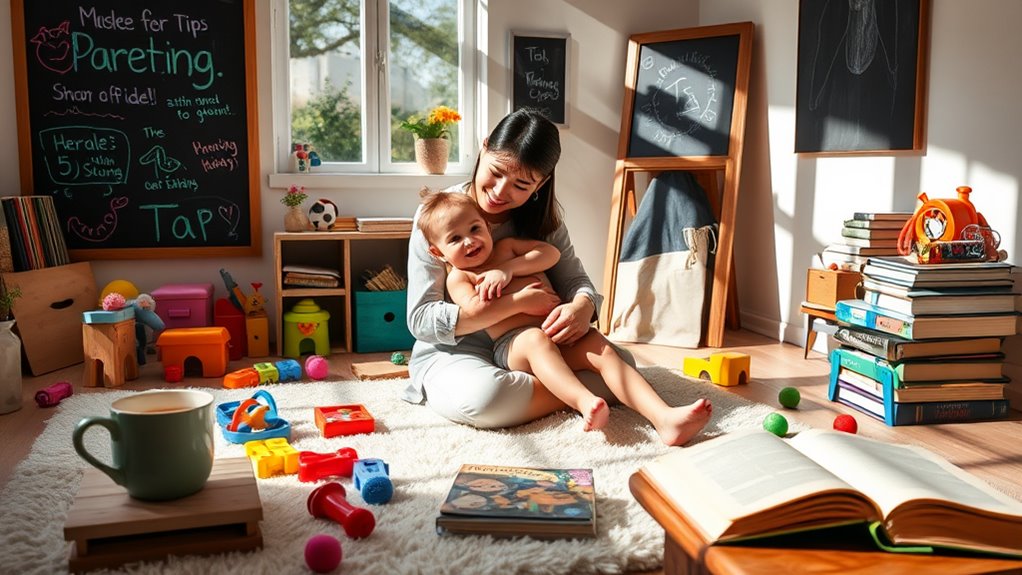The Importance of Teamwork in Co-Parenting
When you think about co-parenting, it’s easy to focus on the challenges, but teamwork can transform those hurdles into opportunities for growth. By collaborating effectively, you not only create a stable environment for your children but also model essential life skills. You might be surprised at how shared responsibilities can lighten your load and foster a more harmonious relationship. What strategies can you implement to enhance this partnership, and how might those strategies impact your children’s emotional development? The answers could redefine your approach to parenting together.
Defining Co-Parenting
Co-parenting is a collaborative approach that emphasizes partnership and shared responsibility in raising children after separation or divorce. When you decide to co-parent, you’re not just sharing a child; you’re joining forces to create a positive environment for them. You and your ex may not be together anymore, but that doesn’t mean you can’t work as a team.
Think of it like a sports team. You both have different roles, but the goal is the same: your child’s happiness and well-being. Communication is key! You’ll need to talk openly about schedules, discipline, and important events. Make sure to listen as much as you speak; it’s a two-way street.
Setting up rules and boundaries together helps create stability for your child. It feels good to know you’re both on the same page.
Sure, there might be bumps along the way—like forgetting to pick up the kids or misunderstandings about plans—but that’s normal. Keep your focus on the kids, and remember, laughter can be a great way to ease tension.
In the end, co-parenting means putting your child first, even when it feels a little tricky.
Benefits of Teamwork
Effective teamwork in co-parenting brings numerous benefits that can greatly enhance your child’s life. When you and your co-parent work together, it creates a stable and secure environment for your kiddo. Kids thrive when they see their parents cooperating, showing them that teamwork matters.
You’ll find that sharing responsibilities makes things easier for both of you. Instead of one person feeling overwhelmed, you can split tasks and support each other.
Plus, when you both agree on rules and expectations, your child knows what to expect. This consistency helps them feel safe and understood.
Another bonus? Your child learns valuable lessons about collaboration and respect. They’ll see firsthand how teamwork can solve problems, making them better equipped to handle their own relationships in the future.
And let’s not forget about less stress for you! A united front means fewer arguments and misunderstandings, which can lighten the load on your emotional health.
Effective Communication Strategies
Clear communication is essential for successful teamwork in co-parenting. When you and your co-parent communicate effectively, you create a smoother path for raising your kids.
First, try to keep things simple. Use clear, direct language. Instead of saying, “We should probably think about changing the schedule,” say, “Let’s change the schedule.” This way, there’s no confusion about what you mean.
Next, listen actively. When your co-parent talks, really hear what they’re saying. Show you’re listening by nodding or saying things like, “I understand.” This helps build trust and shows you care about their feelings.
Also, don’t forget to use “I” statements. Instead of saying, “You always forget to pick up the kids,” try, “I feel stressed when the pickup plan isn’t followed.” This way, you express your feelings without sounding accusatory.
Finally, try to check in regularly. Just a quick text or call can keep both of you on the same page. Making communication a priority can turn challenges into teamwork.
Establishing Common Goals
Setting shared objectives can greatly enhance your co-parenting experience. When you and your co-parent sit down to discuss what you both want for your kids, magic happens! You’re not just two separate people; you’re a team working toward the same end goal.
Start by identifying what’s important to both of you. Maybe it’s ensuring your kids have a stable home life or encouraging them to excel in school. Whatever it is, write it down!
Now, it’s not all about serious stuff. You can throw in some fun goals too! How about planning a family game night or a monthly outing? These shared experiences help your kids see that you both care and enjoy spending time together, even if you live apart.
Once you’ve got your goals, keep checking in with each other. Life happens, and things can change. Having regular chats about your objectives helps you stay on track, and it shows your kids that teamwork matters.
Plus, who doesn’t love a little high-five when you achieve something together? So, gather your thoughts, set those goals, and watch how much easier co-parenting can be!
Conflict Resolution Techniques
Maneuvering conflicts in co-parenting can feel intimidating, but with the right techniques, you can turn disagreements into opportunities for growth.
First, always remember to listen. When your co-parent shares their thoughts, give them your full attention. It’s like watching a movie—you don’t want to miss the best parts!
Next, use “I” statements instead of “you” statements. For example, say “I feel overwhelmed when plans change last minute” instead of “You always change plans!” This way, you avoid sounding accusatory and focus on your feelings.
Another handy trick is to stay calm. Take a deep breath if things heat up. A little humor can lighten the mood too—just don’t make jokes at your co-parent’s expense!
When you do find a solution, make sure it works for both of you. Compromise is key; it’s like trading snacks—everyone should feel satisfied in the end.
Lastly, don’t hesitate to take a break if discussions get too heated. A short pause can help you both cool down and gain perspective.
The Role of Flexibility
Flexibility plays an essential role in successful co-parenting. When you and your co-parent can adapt to changes, it makes everything smoother. Life’s unpredictable, right? Sometimes plans fall through, or your child’s needs change. Being flexible helps you navigate these bumps in the road together.
Imagine one of you has to work late, and the other had plans. If you can switch things up without throwing a tantrum, it shows teamwork.
Flexibility also means being open to new ideas. Maybe your co-parent wants to try a different approach to bedtime. Instead of insisting on your way, give it a shot! You might find it works better for everyone.
It’s important to communicate, too. When you’re both on the same page, it’s easier to be flexible. Check in regularly about schedules and any changes. You’ll both feel more in control, and it helps reduce stress.
Plus, your child will appreciate seeing you two work together, even when things don’t go as planned. Remember, flexibility isn’t about bending over backward; it’s about finding a balance that works for your family.
Supporting Each Other’s Parenting Styles
Co-parenting involves blending different parenting styles, and supporting each other in this journey is essential.
It’s like mixing two different flavors of ice cream—sometimes it works, and sometimes it’s a little rocky! When you both embrace each other’s unique ways of parenting, you create a more harmonious environment for your kids.
Start by chatting about your approaches. You might be strict about homework while your co-parent prefers a more laid-back method. That’s okay! Talk about what’s best for your kids and find common ground.
Maybe you can agree on a balance, where homework gets done but some fun time is included too.
Remember, you’re a team, and teamwork means lifting each other up. Encourage each other when things get tough. If one of you feels overwhelmed, listen and offer support.
Little reminders can help, like “You’re doing a great job!” or “I love how you handled that!”
When you celebrate each other’s strengths, it makes co-parenting smoother.
Creating a Consistent Routine
To help your kids thrive, establishing a consistent routine is key. Kids love knowing what to expect, and a routine gives them that sense of security. It’s like a roadmap for their day, helping them navigate through meals, homework, and playtime.
You and your co-parent can sit down together and create a schedule that works for both households. This way, everyone’s on the same page!
Start with the basics: wake-up times, meal times, and bedtimes. Make sure these times are similar, so your kids don’t feel like they’re living in two different worlds. You can even add fun activities, like family game night or movie night, to make the routine more enjoyable.
Don’t forget to be flexible, though! Life happens, and sometimes routines need a little shake-up. Just communicate changes with each other and your kids. They’ll appreciate knowing what’s going on.
Encouraging Positive Interactions
Positive interactions between you and your co-parent can greatly influence your children’s emotional well-being. When you both work together and show kindness, it creates a warm environment for your kids. Think of it like a team sport; if you play well together, everyone wins!
Start by communicating openly. If something’s bothering you, talk about it instead of letting it fester. Sharing a laugh or a light moment can also make a big difference. Kids love seeing their parents get along, and it helps them feel safe and loved.
Try to celebrate your co-parent’s successes, even the small ones. A simple “Great job!” can go a long way.
And don’t forget to show appreciation for each other’s efforts. A little compliment can brighten someone’s day, making it easier to work together.
Remember to keep your interactions positive, even when discussing challenges. Use “we” instead of “you” to remind yourselves that you’re in this together.
With teamwork and a sprinkle of humor, you can create an atmosphere where your kids flourish. After all, happy parents lead to happy kids!
Long-Term Impact on Children
Children’s emotional and psychological development is profoundly influenced by the co-parenting dynamic you and your partner create. When you both work together as a team, it helps your kids feel secure and loved. They see that even though you mightn’t be together, you’ve got their backs.
This teamwork can lead to kids who are more confident and better at forming their own relationships later in life.
On the flip side, if you’re constantly at odds, it can create confusion and stress for your children. They might feel torn between you, leading to anxiety or even behavioral issues.
It’s like a tug-of-war, and guess who gets pulled in the middle? That’s right—your kids!




